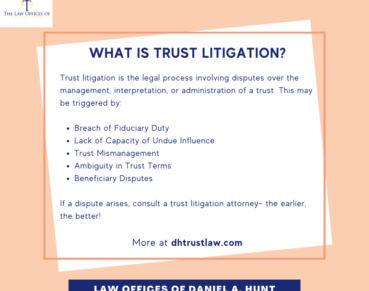The Stages of Trust and Estate Litigation
After the death of a loved one, the process of administering the estate is not easy. Even when the decedent had a comprehensive estate plan, disputes can still arise among the beneficiaries. Trust and estate disputes may lead to litigation when the issues can’t be resolved between the parties. If you are involved in a California trust or estate dispute that is headed toward litigation, understanding the stages of litigation can help you navigate the process.
Investigation and Research
The first stage of trust or estate litigation involves investigation and research. It is essential that you discuss your case with a lawyer as soon as possible so your legal team can have the time they need to investigate the facts surrounding your claim thoroughly. Your lawyer will also need to consider the applicable law to your case and will ask you for key information as they investigate your case.
The Pleading Stage
After each party’s lawyer has investigated the claim, the pleading stage will begin. Pleadings are the legal filings that each party will submit to the court. In a pleading, each party will formally state their legal claims and defenses.
The lawsuit will begin when the plaintiff or petitioner files their complaint. The complaint is the legal petition outlining the claims the plaintiff is making against the defendant. Each claim is a separate cause of action. Examples of causes of action in trust and estate litigation include undue influence, breach of fiduciary duty, and fraud.
The Discovery Stage
Discovery is the stage during which each party discloses their evidence to the other party. During this stage, you will have a better idea of the likelihood of success in your case. The discovery process will reveal the strengths and weaknesses of your opponent’s legal arguments.
During the discovery process, you will send out interrogatories – written questions that your opponent must answer. Your lawyer may request admission of certain types of evidence to the court and document requests.
Depositions of Expert Witnesses
Your lawyer may choose to depose expert witnesses during the discovery process whose testimony could support your legal claims. Expert witnesses will provide an opinion on a subject related to your case beyond what an average person could provide. The testimony of expert witnesses can help a judge decide your case.
The discovery process must end 30 days before the trial begins, but the cutoff for expert discovery lasts until 15 days before the trial begins.
The Mediation Stage
Mediation is a crucial part of the trust and estate litigation process. The parties will try to settle the disputed issue during the mediation stage to avoid going to trial. Going to trial can be an expensive and lengthy process. Typically, both parties are motivated to try and resolve their issues and settle them out of court.
Working with an unbiased, third-party mediator is the most common form of alternative dispute resolution in trust litigation cases. The judge overseeing your case could order you to participate in mediation before setting a trial date.
Trial Preparation
If the mediation process is not effective, the next step is to begin trial preparation. Sometimes negotiations continue during the trial preparation period. During trial preparation, your legal team organizes the evidence and information they have obtained during the discovery process. They will also create a compelling, overarching legal narrative using the evidence they have gathered.
Your lawyer will be required to identify all documents and witnesses that they will use during the trial. As a result, they may need to compel certain witnesses to appear or issue subpoenas. They will also organize the financial, medical records, deposition transcript, and discovery responses that they will use in court.
The Trial
When a settlement is not a possibility, the case will proceed to trial. Before your trial, you’ll be required to attend a Mandatory Settlement Conference – a last-ditch effort to settle before trial. If not, the trial will commence. Your lawyer will present your case to the judge during the trial stage by presenting evidence in your favor.
The trial process varies in length and could last anywhere from a few days to months. Depending on the case, the trial may not take place over consecutive days. Instead, it could be spread out over many weeks. Once both sides have had the opportunity to present their case and witnesses, the judge will have 90 days to reach a decision.
The Appeal
If the judge rules against you and you lose at trial, you still have another option. You will have the right to appeal your case in most situations. Under the California Probate Code, there are specific scenarios in which you can appeal a trust or a state matter. However, the right to appeal a trust and estate decision is subject to strict time limits.
If you are considering appealing your case, we recommend discussing your case with a lawyer as soon as possible. You will need to act quickly after the initial findings of the trial court judge are issued. You do not want to unintentionally lose your chance to appeal the decision by waiting too long. As with the discovery process, your lawyer will need time to develop a legal strategy and draft your appellate documents.
Discuss Your Trust and Estate Litigation with an Experienced Lawyer
The trust and estate litigation process may seem overwhelming, but you do not have to go through it alone. At the Law Office of Daniel A. Hunt, our experienced estate litigation lawyers are here to guide you through the trust litigation process while protecting your rights and goals. Our law firm has helped many Sacramento-area residents protect themselves through a trust or estate lawsuit. Contact us today to schedule an initial consultation with one of our skilled lawyers.
Law Offices of Daniel A. Hunt
The Law Offices of Daniel A. Hunt is a California law firm specializing in Estate Planning; Trust Administration & Litigation; Probate; and Conservatorships. We've helped over 10,000 clients find peace of mind. We serve clients throughout the greater Sacramento region and the state of California.




